The Bush administration appears determined to sign off on a free trade agreement with Peru before leaving office on January 20th despite widespread concern that Peru’s laws are still not in compliance with its obligations under the agreement. U.S. environmental, labor and development organizations said that a new set of reforms passed by Peru’s Congress this week are inadequate to fix all the problems. They urged the U.S. Trade Representative to hold off putting the FTA into effect until it can be verified that all provisions to protect the environment, promote worker rights and ensure access to affordable medicines are in place.
“The U.S. Congress voted for an FTA that Members believed represented a new day for environmental protection and worker rights in trade agreements,” said Susan Ellsworth, Associate Representative with the Sierra Club. “This is not what will happen if Peru rushes through flawed laws at the 11th hour. We need sufficient time and a transparent process to ensure that Peru’s laws and regulations fully comply with the letter and spirit of the agreement.”
In a last-minute effort to get the Bush Administration to allow the FTA to enter into force before leaving office, the Peruvian Government introduced a new series of legislative reforms on January 8th (“Proyecto de Ley 2958”) that were only passed into law on January 13th. They include changes to a highly controversial new Forestry Law, which initially caused outrage among environmentalists in Peru by creating perverse incentives for potentially large-scale deforestation. These new reforms fail to fully address all of the problems with that legislation – and even create some new ones – that could result in greater deforestation. Peru has the second-largest part of the Amazon rainforest, containing some of the world’s greatest biodiversity as well as many indigenous peoples.
Peru also has yet to enact reforms necessary to bring its labor laws into full compliance with its commitments in the FTA. Many members of the U.S. Congress, including President-elect Barack Obama, supported the U.S.-Peru agreement in 2007 because it included new and stronger provisions to promote worker rights and protect the environment. But the rush to certify the FTA now threatens to undercut these advances and lock inadequate laws into place.
"Peru’s labor laws still fall far short of meeting International Labor Organization standards, and we are deeply disappointed with the Bush administration’s decision to rush implementation without first securing compliance with the agreement’s provisions,” said Thea Lee, Policy Director at the AFL-CIO. “This represents a wasted opportunity and shows poor faith on the part of our own government.”
Peruvian workers and environmentalists have long advocated for such reforms without success and had hoped that the new provisions included in the U.S.-Peru FTA would bring real change. But, so far, they have been severely disappointed by the process.
"In the face of the Peruvian government’s rush to seek implementation of the FTA before President Bush leaves office, the Unitary Workers Central (CUT) and the General Confederation of Workers of Peru (CGTP) urge the government to slow down and protect the rights of working people. The best way to do this would be to pass a new General Labor Law,” said CUT President Julio Cesar Bazan and CGTP President Mario Huaman.
"If this FTA is allowed to take effect without full implementation of Peru’s obligations, the people of Peru will lose an important opportunity to secure reforms that promote worker rights, protect the environment and ensure access to affordable medicines,” added Gawain Kripke, Oxfam America Policy Director. “Reforms to date are inadequate and some laws recently enacted in the context of the FTA undermine the rights of indigenous peoples and farming communities."
In November, both the Democratic leadership of the Ways & Means committee and, separately, a coalition of U.S. advocacy groups representing labor, environmental and human rights concerns sent a letter to the U.S. Trade Representative Susan Schwab alerting her to the fact that there were serious concerns about the agreement’s implementation. Some of these concerns have still not been addressed, these groups say, while some new ones have been created. Yesterday, the Chairs of the Ways and Means Committee and the Trade Subcommittee again wrote to Susan Schwab asking that USTR not rush to certify the agreement’s entry into force, raising serious concerns regarding Peru’s lack of compliance with obligations on worker rights.
“While a number of positive reforms have been enacted, the necessary debates in Peru are still playing out and certification at this point would be premature,” said Ani Youatt of the Natural Resources Defense Council. “We hope to work with the Obama Administration to ensure that the environmental safeguards laid out in the FTA are indeed realized in both law and in practice.”
Contacts:
AFL-CIO – Jeff Vogt – 202 637-3904
Defenders of Wildlife – Alejandra Goyenechea – 202-772-3268
Environmental Investigation Agency – Andrea Johnson – 202-483-6621
Natural Resources Defense Council – Erin Allweiss – 202-513-6254
Oxfam America – Laura Rusu – 202-459-3739
Sierra Club – Susan Ellsworth – 202-548-6593
WashingtonOffice on Latin America – Vicki Gass – 202-797-2171
World Wildlife Fund – Jessica McGlyn – 202-778-9729
To read a November 2008 letter issued by the groups to Chairmen Rangel and Levin, Ranking Members McCrery and Herger, and Ambassador Schwab click here .

